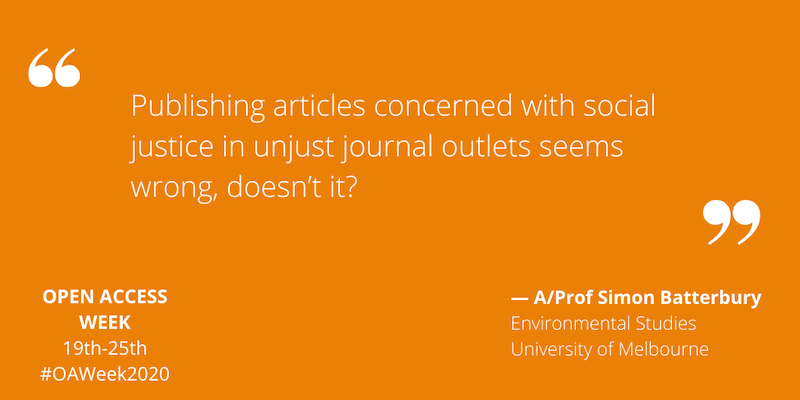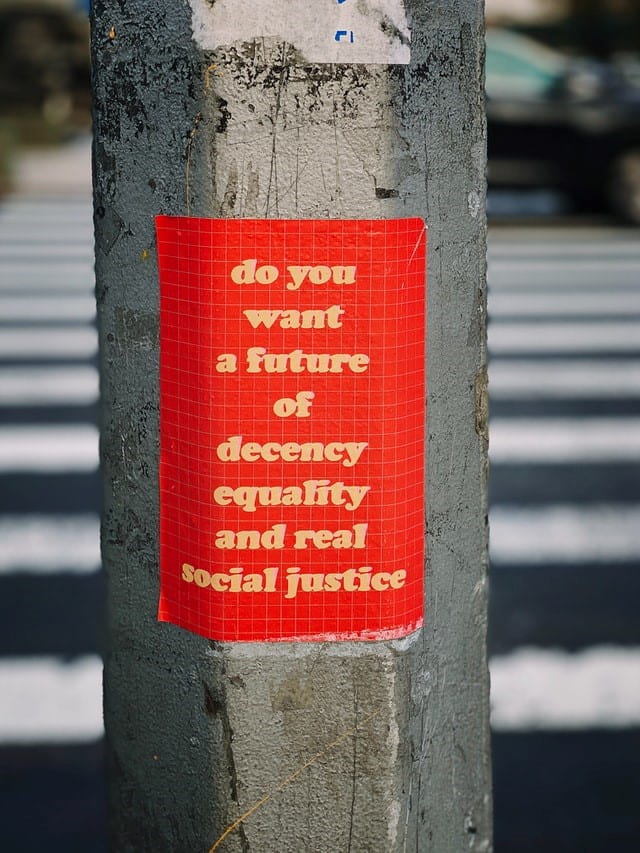
Seeking social justice in scholarly publishing
For Open Access Week 2020, Dimity Flanagan (Manager, Scholarly Communications) is speaking with researchers across the University of Melbourne about why Open Access is important and the practicalities of making their research open.
Today we are speaking with Simon Batterbury, Associate Professor in Environmental Studies at the University of Melbourne and Visiting Professor at Lancaster University, UK. He is a long-time champion of Open Access. Simon is co-editor of the Journal of Political Ecology, one of the longest standing platinum open access journals in the social sciences.
Simon recently co-authored an Open Access Manifesto for Freedom, Integrity, and Creativity in the Humanities and Interpretive Social Sciences. A manifesto that wishes to “repoliticise Open Access to challenge existing rapacious practices in academic publishing” – a fitting topic considering this year’s Open Access Week theme, open with purpose: taking action to build structural equity and inclusion.
Q. What are your main concerns about how Open Access is currently being pursued by funders and universities?
Stage one of the Open Access (OA) movement promoted the democratization of scholarly knowledge, making work available so that anybody could read it (usually via the web, from the early 1990s). This had an impact and remains important, as illustrated by research needs during the COVID-19 crisis. But, in a twist, OA publishing is being turned to the commercial advantage of the major publishers who had locked articles behind paywalls for decades, took our copyright, and charged universities handsomely for journal subscriptions. OA publishing of academic work is now being mandated, particularly in Europe, and so the big publishers have shifted journals from subscription to Open Access to retain and increase their market share. They are also buying up smaller publishers and society journals. The fees they charge authors are huge, with US$3000 [A$4,200] being common in the STEM disciplines and even social sciences to publish an OA article in a prestigious or middle-ranking journal, and sometimes higher than this. Studies show oligopolistic market power means commercial Article Processing Charges (APCs) are overpriced relative to impact, and subject to hyperinflation too. This is not OK.
Stage two of the OA movement is to create equality in publishing – to consider the conditions under which material is published. We know that the cost of publishing an article lies well below these commercial fees (often hundreds of dollars, not thousands), which partly explains corporate profits reaching in excess of 30% per year, at the expense of authors and libraries. As the Manifesto says, we need to reward and budget for more publishing in socially just outlets. Funding agencies and universities can pay some costs, but we also need to allow academics and library staff time to work in the cooperative and convivial alternative Open Access publishing sector as editors, publishers and reviewers. Latin America already works this way with its major journals published by universities online using open source software, with some support from public funds to reduce or remove APCs.
Q. Do you think the ethical arguments around Open Access, particularly around equity and inclusion, resonate with enough academics in the Global North?

Not enough. Social justice concerns and principles appear in much of the work published in the social sciences and humanities (in particular). Yet articles are most commonly found in commercial journals, either paywalled ones or OA ones with high APCs. As we say in the Manifesto, scholars are just not connecting the dots – they want to boost their publishing profile and can overlook the profit motive and labour conditions of the for-profit publishers. Many senior academics influencing career progression consider prestige over publication ethics (e.g. “publish in Science or Nature“). To me social justice publishing requires addressing stage one and two above, which means avoiding the more profit-driven companies (for a variety of reasons) where possible.
Publishing articles concerned with social justice in unjust journal outlets seems wrong, doesn’t it?
Q. Given the current volume of academic publishing, is it realistic to think that we can do without commercial publishers that operate on much larger scales?
Several STEM disciplines publish a high number of articles and make this claim. However, there are significant free Open Access alternatives linked to departments and universities, as Sir Tim Gowers, a professor at Cambridge has long championed for mathematics. In the social sciences and humanities there is vast potential for more academics and library staff to become involved in journal publishing not only to assist their colleagues, but also to ‘take back’ publishing. My own listing of journals identifies and tracks hundreds of social science journals, many of which could use more submissions and input.
Q. The University of Melbourne recently signed up to DORA, what changes would you like to see come from this commitment?
DORA addresses many of my worries above. It commits signatories to no longer using the impact factor of a journal in assessing the worth of an article, or its author(s). Authors can write for appropriate and reputable outlets, not just highly ranked ones. Hiring and promotion at Melbourne must henceforth consider the quality of research, not place of publication. This will be a significant change for some involved in these processes, but it is common sense, and part of social justice commitments.
Q. The Manifesto mentions that academics feel under increasing pressure to “play the game” – what advice would you give to early career researchers who feel this pressure but want to support scholar-led OA publishing?
My journal listing for some disciplines, and the Directory of Open Access Journals, include many free or academic-led OA journals which have established reputations, if you feel you need to strengthen your cv. If more universities adopt the DORA declaration, and senior academics accept it, then the range of ‘prestige outlets’ will be enlarged, or become less vital for hiring and promotions. Social justice considerations are maybe secondary at certain career stages but should never be forgotten and sometimes need to be asserted, with a mention on a cv or in an interview. You should be able to publish justly without fear of losing your job, or never getting one. Otherwise, academic freedom is breached.
This blog post is released under a CC BY license.
Leave a Reply